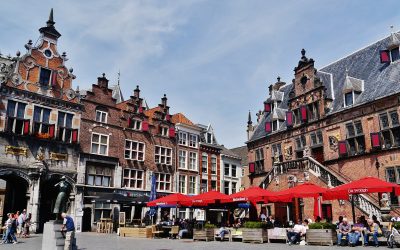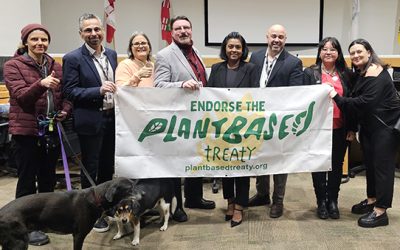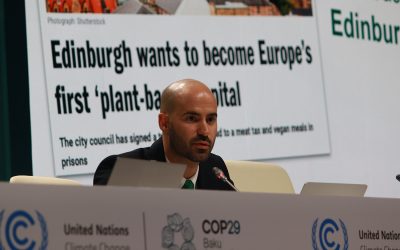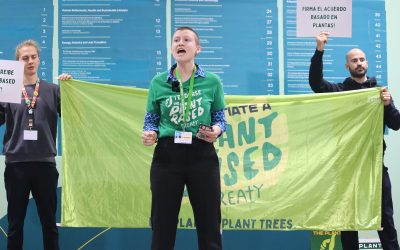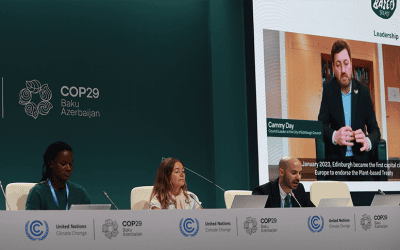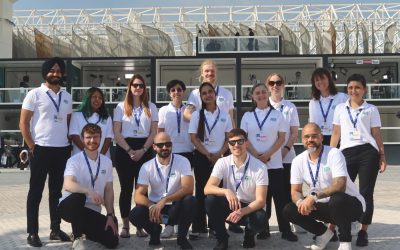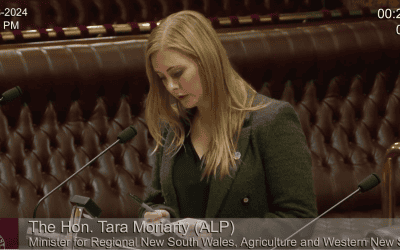February 28, Braga — The city of Braga, one of the oldest cities in Portugal, with a rich 2,000 years of history and cultures, has become the second city in Portugal to endorse the Plant Based Treaty in recent months. The move means they join 35 towns and cities worldwide, including Tavira, and European capitals, Amsterdam, Belfast and Edinburgh, in calling for a global Plant Based Treaty to be added to the Paris Agreement.
The motion was introduced by eng. Altino Bessa, from the environment council, and recognizes that “animal agriculture is responsible for around 43% of methane emissions in Portugal, being above the global average of 32%,” and, “Portugal has a legal commitment to reduce GHG emissions by 55% by 2030 compared to 2005, and by 90% by 2050.”
The motion states: “Portugal has the highest footprint per capita of all the Mediterranean countries due to its high consumption of meat and fish (such as tuna, swordfish and cod), accounting for 30% of its ecological footprint, higher than the transport sector (20%), and the food system is of enormous importance in reducing its environmental impact…. Making a transition towards plant-based diets has the potential to reduce land use for food by 76% globally, allowing us to reforest land and restore carbon sinks.”
Media Contacts:
-
Noel Santos, City Campaigner: [email protected], +351935403296
-
Anita Krajnc, Global Campaign Coordinator: [email protected], +14168256080
Photos and video:
https://drive.google.com/drive/u/2/folders/160m3PJAY9EtaBKeeeGm6cCpCquax91RY
Media Contacts:
-
Noel Santos, City Campaigner: [email protected], +351935403296
-
Anita Krajnc, Global Campaign Coordinator: [email protected], +14168256080
Photos and video:
https://drive.google.com/drive/u/2/folders/160m3PJAY9EtaBKeeeGm6cCpCquax91RY
February 28, Braga — The city of Braga, one of the oldest cities in Portugal, with a rich 2,000 years of history and cultures, has become the second city in Portugal to endorse the Plant Based Treaty in recent months. The move means they join 35 towns and cities worldwide, including Tavira, and European capitals, Amsterdam, Belfast and Edinburgh, in calling for a global Plant Based Treaty to be added to the Paris Agreement.
The motion was introduced by eng. Altino Bessa, from the environment council, and recognizes that “animal agriculture is responsible for around 43% of methane emissions in Portugal, being above the global average of 32%,” and, “Portugal has a legal commitment to reduce GHG emissions by 55% by 2030 compared to 2005, and by 90% by 2050.”
The motion states: “Portugal has the highest footprint per capita of all the Mediterranean countries due to its high consumption of meat and fish (such as tuna, swordfish and cod), accounting for 30% of its ecological footprint, higher than the transport sector (20%), and the food system is of enormous importance in reducing its environmental impact…. Making a transition towards plant-based diets has the potential to reduce land use for food by 76% globally, allowing us to reforest land and restore carbon sinks.”
The Plant Based Treaty motion commits Braga to developing a plant-based food strategy, including:
- Use municipal communication channels to encourage sustainable, affordable eating habits and address food insecurity;
- Collaborate with community groups to establish new community gardens and assess vacant land for plant-based food production;
- Organize plant-based cooking workshops with local organizations;
- Promote organic horticulture in schools and educate students on the environmental and ethical impact of food choices.
Noel Santos, Plant Based Treaty Portugal campaigner, said, “We ended 2024 with Tavira’s endorsement, and now we begin 2025 with Braga’s commitment to this call for a Global Plant Based Treaty. All the more so after we met with Tavira’s executive and agreed on further measures to facilitate access to menu changes both in schools and in the town’s cafés and restaurants. This will be the year of the Plant Based Treaty in Portugal.”
In October 2024, Tavira became the first city in Portugal to endorse the Plant Based Treaty and commit to:
- Support and develop awareness-raising and information campaigns on the environmental impacts and health benefits of plant-based foods;
- Strive to reduce consumption of animal-based products and meals in schools and local organizations;
- Promote initiatives to increase wild trees and plants, green corridors and community crops in public spaces;
- Implement measures for food sovereignty, especially aimed at people on low incomes.
Background
The Plant Based Treaty is modeled on the Fossil Fuel Non-Proliferation Treaty and since its launch in August 2021, the initiative has received support from 36 cities, almost a quarter million individual endorsers, 5 Nobel laureates, IPCC scientists, and more than 3000 groups and businesses.
The Plant Based Treaty has secured high-profile endorsements from celebrities, including Paul, Mary and Stella McCartney, who issued a written statement calling for politicians to support the Plant-Based Treaty. They said: “We believe in justice for animals, the environment and people. That’s why we support the Plant Based Treaty and urge individuals and governments to sign it.”
As cidades portuguesas de Braga e Tavira subscrevem o apelo por um Tratado Plant Based Global e desenvolvem estratégias alimentares de base vegetal para reduzir as emissões de gases com efeito de estufa
28 de fevereiro, Braga – A cidade de Braga, uma das cidades mais antigas de Portugal, com 2.000 anos de história e cultura, tornou-se a segunda cidade em Portugal a apoiar o Tratado Plant Based nos últimos meses. Com esta iniciativa, Braga junta-se a 35 cidades de todo o mundo, incluindo Tavira, e às capitais europeias, Amesterdão, Belfast e Edimburgo, que apelam a um Tratado Plant Based a acrescentar ao Acordo de Paris.
A moção foi apresentada pelo Eng. Altino Bessa, vereador com os pelouros da proteção civil e ambiente, e reconhece que “a pecuária é responsável por cerca de 43% das emissões de metano em Portugal, estando acima da média global de 32%” e que “Portugal tem o compromisso legal de reduzir as emissões de GEE em 55% até 2030, em comparação com 2005, e em 90% até 2050”.
A moção afirma que: “Portugal tem a maior pegada ecológica per capita de todos os países mediterrânicos devido ao elevado consumo de carne e peixe (como o atum, o espadarte e o bacalhau), que representa 30% da sua pegada ecológica, superior à do sector dos transportes (20%), sendo o sistema alimentar de enorme importância na redução do seu impacto ambiental…. A transição para dietas à base de plantas tem o potencial de reduzir a utilização da terra para a produção de alimentos em 76% a nível mundial, permitindo-nos reflorestar a terra e restaurar os sumidouros de carbono”.
A moção do Tratado Plant Based compromete Braga a desenvolver uma estratégia alimentar de base vegetal, incluindo:
1 Usar os canais de comunicação municipais para encorajar hábitos alimentares sustentáveis e acessíveis e abordar a insegurança alimentar;
2 Colaborar com grupos comunitários para estabelecer novas hortas comunitárias e avaliar terrenos baldios para a produção de alimentos;
3 Organizar workshops de culinária de base vegetal com organizações locais;
4 Promover a horticultura orgânica nas escolas e educar os alunos sobre o impacto ambiental e ético das escolhas alimentares.
Noel Santos, ativista do Plant Based Treaty Portugal, afirmou: “Terminamos em 2024 com o apoio de Tavira e agora começamos 2025 com o compromisso de Braga com este apelo para um Tratado Plant Based Global. Tanto mais que nos reunimos com o executivo de Tavira e acordámos novas medidas para facilitar o acesso a mudanças de menu, tanto nas escolas como nos cafés e restaurantes da cidade. Este será o ano do Ttatado Plant Based em Portugal”.
Em outubro de 2024, Tavira tornou-se a primeira cidade em Portugal a subscrever o Tratado Plant Based e a comprometer-se a:
1 Apoiar e desenvolver campanhas de sensibilização e informação sobre os impactos ambientais e os benefícios para a saúde dos alimentos de origem vegetal;
2 Esforçar-se por reduzir o consumo de produtos e refeições de origem animal nas escolas e organizações locais;
3 Promover iniciativas para aumentar as árvores e plantas silvestres, corredores verdes e culturas comunitárias nos espaços públicos;
4 Implementar medidas para a soberania alimentar, especialmente dirigidas a pessoas com baixos rendimentos.
Histórico:
O Tratado Plant Based tem como modelo o Tratado de Não Proliferação de Combustíveis Fósseis e, desde o seu lançamento em agosto de 2021, a iniciativa recebeu o apoio de 36 cidades, quase um quarto de milhão de apoiantes individuais, 5 prémios Nobel, cientistas do IPCC e mais de 3000 grupos e empresas.
O Tratado Plant Based garantiu o apoio de celebridades de alto nível, incluindo Paul, Mary e Stella McCartney, que emitiram uma declaração escrita apelando aos políticos para apoiarem o Tratado. Afirmaram: “Acreditamos na justiça para os animais, o ambiente e as pessoas. É por isso que apoiamos o Tratado Plant Based e apelamos aos indivíduos e aos governos para que o assinem”.
O Plant Based Treaty foi apresentado em…
Plant Based Treaty has been featured in…
More from the Press Centre
Nijmegen endorses Plant Based Treaty and bans meat advertisements
Media Contacts:
Lea Goodett: [email protected], +31 6 10055080
[email protected]
Town of Caledon endorses Plant Based Treaty
Media Contacts:
Brampton endorses Plant Based Treaty to limit climate warming and strengthen food security
Media Contacts:
Press conference: Youth urges leaders to phase-out fossil fuels and transition to a Paris-aligned food system
Media Contacts:
Protest inside COP29 urges countries to negotiate a global Plant Based Treaty that has been endorsed by 33 cities including Amsterdam, Los Angeles and Edinburgh
Media Contacts:
Press Conference: 33 Cities want a Plant Based Treaty added to the Paris Agreement – here’s what it looks like in action.
Media Contacts:
33 Cities want a Plant Based Treaty added to the Paris Agreement – here’s what it looks like in action.
Media Contacts:

































